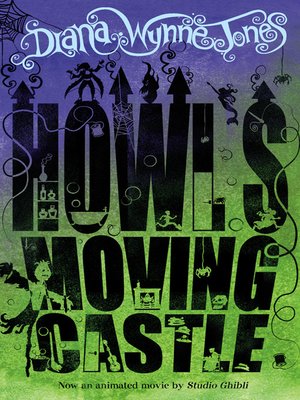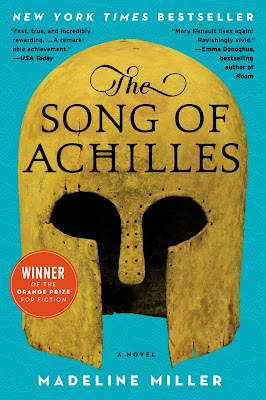
Book Review: Howl's Moving Castle by Diana Wynne Jones
Goodreads Description: Sophie has the great misfortune of being the eldest of three daughters, destined to fail miserably should she ever leave home to seek her fate. But when she unwittingly attracts the ire of the Witch of the Waste, Sophie finds herself under a horrid spell that transforms her into an old lady. Her only chance at breaking it lies in the ever-moving castle in the hills: the Wizard Howl's castle. To untangle the enchantment, Sophie must handle the heartless Howl, strike a bargain with a fire demon, and meet the Witch of the Waste head-on. Along the way, she discovers that there's far more to Howl—and herself—than first meets the eye.
My Review: I wanted to write a review that focused solely on the book, but I have watched and loved the Studio Ghibli movie for years, so it feels impossible not to compare them. Especially since the stories are so close yet decisively different in very important ways. There will be SPOILERS in this review, so if spoilers spoil for you, then, y'know, look away now.
Sophie Hatter is doomed. It's something she's known and accepted about herself since she was young. As the eldest of three, she is destined to never find her fortune, while her younger sisters are sure to find success in their endevours. Feeling curbstomped by fate, Sophie resigns herself to work at her family's hat shop for the rest of eternity with nothing but the hats to talk to. This ages and cripples Sophie long before she ever meets the Witch of the Waste. She identifies as the boring old spinster in grey so completely that by the time the Witch curses her with the body of an old woman, it's more of her outside transforming to match her inside, rather than Sophie turning into something she's not. She adapts to her new body shockingly well because of this, and the true conflict of the book becomes convincing Sophie to change back.
Ghibli's movie version may have been a love story, but Jones' book is a self-love story. Sophie has little to no self-esteem /self-worth and resigns herself to the inevitable. Unique to the book, Sophie is also a witch with the ability to speak life into things, and this, ultimately, seals her fate. Howl (as well as others) would have been able to remove Sophie's curse right off the bat, were she not a powerful witch who reinforced the Witch of the Waste's curse with all her negative self-talk. Through Sophie, we get to see the very real power of negative self-talk, how it limits us and distorts our perception, and ultimately how we can overcome it, even if it never entirely goes away.
As for the other characters, they're all so much more alive than their movie counterparts. While Studio Ghibili took these characters and filed down all their sharp corners, the book delivers us characters with juicy flaws that both aggravate and soften the reader. Howl is the flamboyantly dramatic king of train wrecks in every scene as opposed to one (*coughhairdyescenescough*), Michael is a teenager with his own goals outside of Howl, and both of Sophie's sisters are fierce, independent women who fight for their futures. Seeing these characters with their own flaws and motivations makes you realize how much of them was stripped away for the romanticized movie version of them.
The movie also simplified the plot extensively, in ways that didn't always make sense, but hey, it looked pretty, right? The Witch of the Waste is a more serious villain, Howl is actually a college student from Wales, Sophie's sisters swap places with magic and start courting Michael and Howl, and a schoolteacher back in Wales tries to capture Howl's heart in a dangerous way. All of this leads to a much more satisfying story than the aesthetically pleasing but nutritiously hollow snack of a movie by Ghibli.
Sophie is an unreliable narrator which makes this book so good to re-read. I suppose calling her an unreliable narrator is unfair, since she's not, really, but Jones is so good at making sure we see the world through her perspective that we can miss what's happening. She doesn't catch on to Calcifer's clues right away, and so those clues are buried, without any narrative cues to the reader to let them know this is IMPO INFO YO. Sophie's self-esteem issues and her judgement of others keep her from being able to see Howl's feelings towards her, which leads her to wildly misinterpreting situations and creating a wonderful duality where the reader can see why Sophie thinks this way, while also seeing that it's not actually true. Jones accomplishes this with a deft touch that doesn't make Sophie look delusional, nor is it overtly obvious that her perception has clouded her vision.
The only complaint I'd have, is I didn't feel there was enough romantic payoff after an entire book full of longing and will-they-won't-they. Though, I suppose that's what the sequels are for.
TL;DR: 4/5 stars. If you think you know this story from the movie, think again.



